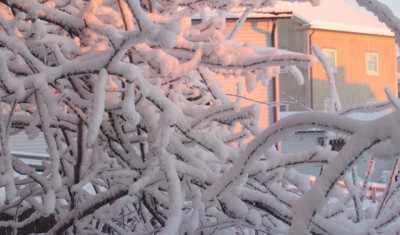You don’t go out to experience minus 25 degrees but to experience what minus 25 degrees does to the world. It can be breathtaking, a landscape made still by the cold. Even a town made still by cold is a kind of miracle. After a day of a thick cold snow mist, this morning there wasn’t a thing in town not covered by frozen snow – every twig, every pole, every fence, every window, every street sign. A layer as thick as three fingers in all directions, not just sitting on top.

It still amazes me, though I experience it every year.
You have to respect the people who work in these temperatures. This weekend at the Snow Festival there were snow sculptors at work, and the only thing that stops me feeling sorry for them is that they choose to do it. Construction workers, or – as happens in Kiruna these days, deconstruction workers – need the right gear, but then they also have small cabins to sit in on the top of their machines, so they’re probably warm as toast up there. In the past though, people just had to manage – building and repairing the railway, for instance, or reindeer herders moving with their herd in winter.
I’ve been reading a recent English translation of what is considered to be the first secular book in the Sami language: ‘An account of the Sami’ by Johan Thuri, published in 1910. Thuri describes Sami reindeer herders’ lives, how the winter migration required stamina, skill and good fortune. Survival was the goal, and anything more than that was an unexpected but welcome bonus. It was a very hard life.
Thuri sometimes describes some part of their daily lives with the word ‘hávski’ – which is translated as ‘pleasant’. It’s a surprising word to find among all the description of hardship.
For things to be ‘hávski’, according to the translator, meant that at that moment, everything was ‘exactly as it should be’. During the winter migrations there were many things that could go wrong. You needed luck on your side, as well as skill to manage the migration and stamina to sustain you. The Sami had to walk long distances with the reindeer, in biting cold conditions with only what they could carry loaded onto a few of the tamer animals. They had to climb mountains, cross rivers, erect tents in freezing winds, and stay overnight in areas without easily available firewood. The animals were liable to scare easily, and hours were spent in the cold herding them somewhere safe for the night. Children had to be cared for, meals prepared, and equipment and clothing dried before the next day’s trek. Despite all this effort, if you managed to organise things well and things worked out as they should, then according to Thuri, life could often be experienced – temporarily at least – as ‘hávski’.
Most of us will never experience anything like this level of hardship, and never have to find the inner resources to survive in those kind of conditions.
I was thinking of this yesterday, when the temperatures went below minus 20 and we were walking on the river. I was testing new boots (my old boots had begun to split and welcome in cold air and snow) and was wrapped up well. On the river it felt bone-chillingly cold, especially as the wind hit the face. Whiteness spread in all directions as an endless expanse of snow mist. Reaching the other side of the river we walked through a low forest where the trees were like giants, cranky white arms reaching out to us and waving their long pointy fingers over our heads.
It was very still, and very silent, and I was aware that my hands and feet were still warm after twenty minutes of walking. I wasn’t fighting the cold, and it was definitely ‘hávski’.

